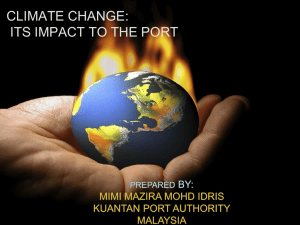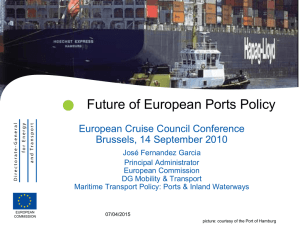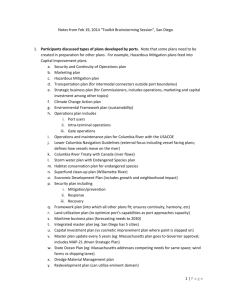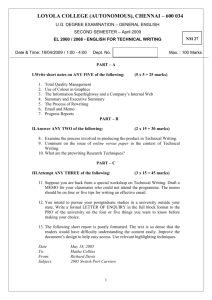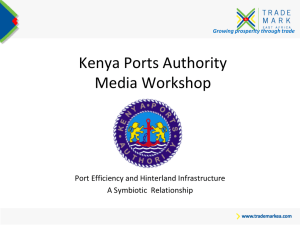WHO ARE THE STRATEGIC PARTNERS? The Government
advertisement
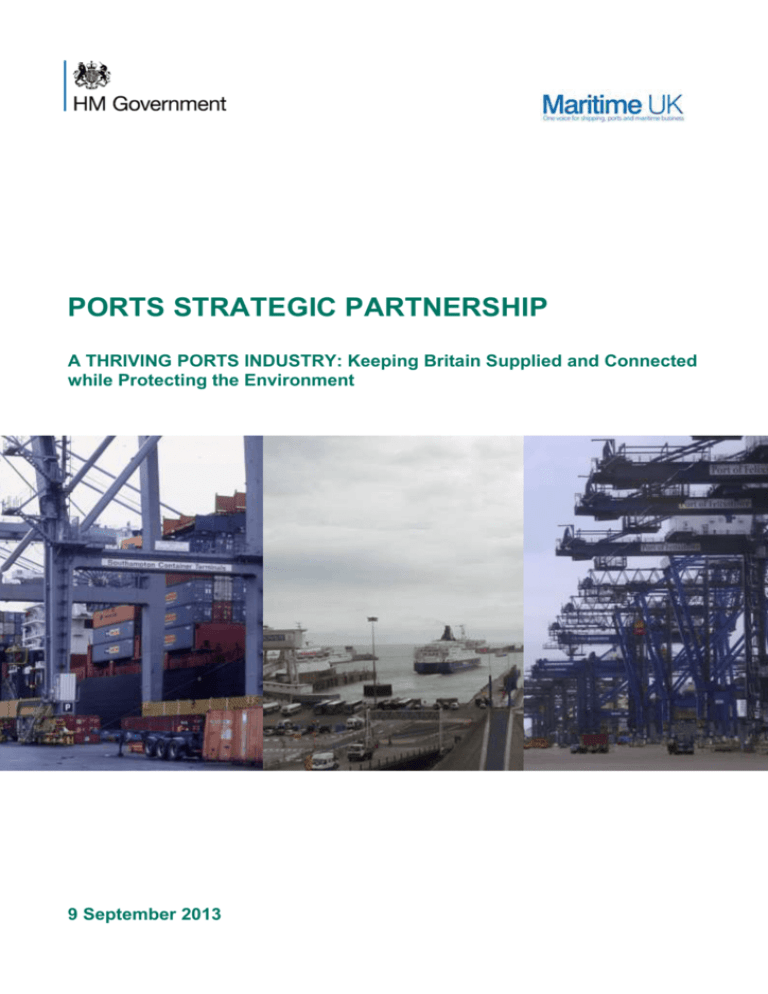
PORTS STRATEGIC PARTNERSHIP A THRIVING PORTS INDUSTRY: Keeping Britain Supplied and Connected while Protecting the Environment 9 September 2013 WHO ARE THE STRATEGIC PARTNERS? The Government Departments with maritime interests work with a wide range of partners, in particular: The United Kingdom Major Ports Group (UKMPG), which is the trade association representing most of the larger commercial ports in the United Kingdom The British Ports Association (BPA), which represents a wide range of ports, terminal operators and port facilities. WHY IS THE PORTS SECTOR IMPORTANT? UK ports handled 501 million tonnes (Mt) of freight traffic in 2012. That is more than eight tonnes (a small lorry-load) for every person in the UK. UK ports handled over 21.1 million international passengers in 2011 and more than 1.6 million passengers began or ended an international cruise in the UK (trebling since 2001). During a difficult economic period, ports invested more than £1.4bn between 2007 and 2011. Much more investment is in the pipeline and more still is consented. WHY HAVE A STRATEGIC PARTNERSHIP? By working together with common purpose, we can achieve more. This dynamic strategic framework will: improve cross Government understanding of different Departmental policy considerations on ports and shipping; facilitate a Ministerial/industry discussion programme; agree joint priorities and actions; and provide a cohesive platform for future strategic development. HOW DOES THE STRATEGIC PLAN WORK? It sets out an overview: This plan sets out in a simple graphic form the various activities being taken forward by Government, by industry and by other interested parties in order to deliver our overarching ambition of A THRIVING PORTS INDUSTRY. It clarifies tasking: It is intended that the more detailed version of the plan will be updated regularly with the specific initiatives being pursued by different parties at any time with clear deadlines. It will evolve dynamically: This plan is not intended to be a set piece. It will evolve as new actions, tasks and decisions are shaped and agreed. WHAT ARE THE PRIORITIES? For the next twelve to eighteen months, the Government and the industry have jointly identified three priority areas: cross-Government co-ordination, effective international engagement (particularly in the EU) and improved planning. We will work to deliver these priorities and will periodically review them. 1. EFFECTIVE CO-ORDINATION ACROSS GOVERNMENT All relevant Departments will take full account of the industry's unique features when formulating policies that could affect them, thus ensuring co-ordination and avoiding, at worst, inconsistency. We shall do this by further developing this Strategic Partnership, and will continue a series of Ministerial Round Tables with industry to promote a common understanding of problems and to identify solutions. 2. A MORE CO-ORDINATED APPROACH TO THE EU To ensure an agreed clear UK approach to European legislation affecting the ports industry, we shall work more closely together on this no matter which Government Department has the formal lead in negotiations. We shall do this by establishing joint working groups where appropriate. This has already begun, for example, in liaison about the Commission's proposed port services Regulation. 3. IMPROVED MARINE AND LANDSIDE PLANNING FOR PORTS Potentially divergent objectives of port development and environmental protection will be addressed so that marine and landside planning takes account of the economic importance of ports and shipping. We shall do this by seeing that ports' interests are thoroughly weighed in decisions on Marine Conservation Zones. Departments and agencies will work together to simplify the application process for planning and related consents. HOW WILL WE EVALUATE? This is a rolling strategic programme and we will undertake to evaluate its achievements and development in summer 2014. CONTACT DETAILS Department for Transport – ports@dft.gsi.gov.uk British Ports Association – info@britishports.org.uk The United Kingdom Major Ports Group (UKMPG) – lisa@ukmajorports.org.uk Maritime UK – jroberts@ukchamberofshipping.com Efficient operations A THRIVING PORTS INDUSTRY: KEEPING BRITAIN SUPPLIED AND CONNECTED WHILE PROTECTING THE ENVIRONMENT 1.4 To support wider business in the port estate and port-related business elsewhere including through LEPs 1.5 To ensure individual ports are resilient to natural or manmade disruption 1.2 To enable free movement of trade and people PROTECTED MARITIME ENVIRONMENT - landside & marine side 2.5 To incentivise early and effective inland/coastal access to ports 1.3 To continue to improve logistics and supply chains 2.2 To make the landside planning system more efficient and effective with more foreseeable outcomes 3.8 To secure long-term resilient port capacity nationally through private sector investment in a competitive ports sector 2.1 To use early & sustained engagement to influence emerging EU port policies 3.7 To invest to innovate 2.3 To minimize the regulatory burden on ports 3.4 To facilitate the building of port capacity to meet future demand 3.2 To encourage port investment by strengthening confidence in long term energy demand Objectives: Yellow Primarily Government Blue 4.4 To safeguard wharves for future maritime use while facilitating regeneration or other alternative uses of redundant waterside estate 4.3 To maintain constructive dialogue with devolved administrations, including where ports policy is devolved 3.3 To promote UK as a place to do maritime business 4.1 To develop the ports sector strategy action plan & crossGovernment interests 3.1 To understand the drivers of port demand growth Goals 4.5 To avoid grants or subsidies distorting competition and investment in the ports industry 3.6 To ensure ports can prosper in fair competition with others 3.5 To recognize and provide good access to existing and new port facilities 4.2 To review & improve crossGovernment mechanisms and ensure consistent policy making Effective Coordination across Government Innovation and investment KEY: POSITIVE “LOCAL” CONTRIBUTION - enterprise & community 2.4 To ensure the marine planning system and marine licensing recognize the importance of socioeconomic activity and the need for economic growth 1.1 To achieve competitive pricing for port services Light, stable regulation SUCCESSFUL GATEWAYS FOR UK TRADE & TRAVEL - today & tomorrow 1.6 To promote and enhance operational skills in the port workforce Primarily industry and trade unions Both Joint stream of work 5.6 To tackle congestion on portcritical inland access routes including through modal shift 5.4 To further reduce any local pollution from port operations 5.3 To ensure MCZs deliver ecological benefits while taking social and economic factors into account 5.1 To maintain and promote port landside and marine safety 5.5 To develop more representative evidence on marine habitats, less biased towards economically exploited zones 5.2 to implement effective, proportionate and cost-effective ISPS and other port security requirements Active engagement in safety, environmental and security agendas 9 September 2013

